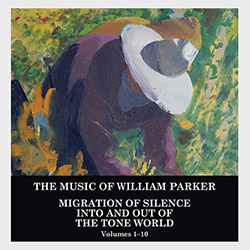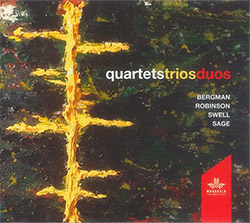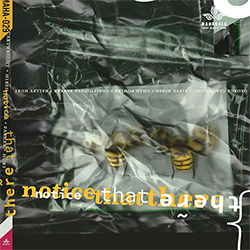
Confronted and assaulted by Asian bigotry in NYC shortly after the start of the pandemic, pianist Eri Yamamoto adopted a wig, mask and sunglasses to hide her ethnicity, about which she sings in the title track of her album, a mix of the sophisticated jazz instrumentals with bassist David Ambrosio and drummer Ikuo Takeuchi punctuated with songs of Yamamoto's pandemic experience.
In Stock
Quantity in Basket: None
Log In to use our Wish List
Shipping Weight: 3.00 units
Sample The Album:
Eri Yamamoto-piano, voice
David Ambrosio-bass
Ikuo Takeuchi-drums
Rika Yamamoto-vocals
Bruce Barth-vocals
Ikuo Takeuchi-vocals
Rich Lamb-vocals
Click an artist name above to see in-stock items for that artist.
UPC: 195269182045
Label: Mahakala Music
Catalog ID: MAHA-035
Squidco Product Code: 32904
Format: CD
Condition: New
Released: 2022
Country: USA
Packaging: Digipack
Recorded at Bleu Frog studio, in NYC, on March 27th, and April 1st, 2022, by Amadis Dunkel and Rich Lamb.
"All of these songs are about my experience of the pandemic while living in New York City. I had never written lyrics or sung on an album before. But I was thinking about certain incidents every day, and for two of the songs, the lyrics came to me with the melodies like an emotional release.
The woman with a purple wig is me. To protect myself from the violence against Asian women, I had to hide my identity, wearing a wig, mask, and sunglasses. In the beginning, I was filled with fear. Writing this song helped me to regain my emotional balance.
I also felt I had to speak out about racial violence against all groups of people. We all need to stand up and work together for peace and understanding. This is why I wrote lyrics for "Colors are Beautiful."
These songs are not about anger. I wrote them to encourage everyone, including myself, to see the world in a more positive way.
Originally, I assumed that another vocalist would sing these songs. But when I played my simple demos for my friend and mentor, William Parker, he said: "Eri, it's your story. It will be more powerful if you sing yourself."
I wrote "Ends to Start" because during the pandemic many things came to an end. But endings are not always completely sad, as sometimes they can give opportunities for new, good things to start."-Eri Yamamoto
"Pianist Eri Yamamoto was born and raised in Japan. but she has been a resident of New York City for over twenty years. She was there in March 2020 when COVID-19 shut down the world and then-President Trump began to call the disease a "Chinese flu." One day, while waiting to start an outdoor concert, she was confronted by a stranger who knocked off her hat, stepped on the electric keyboard she was carrying and called her one of the "(bleeping) Chinese" who had "messed up the world."
She played her concert that day but became so traumatized by the incident that for two years she only went out once a month. When she did, she used a face mask, sunglasses, a hat, and a purple wig to completely conceal her Asian identity. That experience is the story behind the title track of this album. Yamamoto sings in a disarmingly natural voice about buying the wig and how her disguise gave her a feeling of invisibility and safety as her trio's music sways along in an impishly tumbling swing behind her. She sounds vulnerable but at the same time, strong and defiant, feelings summed up in the way she sings the words of the chorus: "I'm just a woman. / Don't hurt me. / Don't hurt me."
Yamamoto also sings on one other track of the album, "Colors Are Beautiful." On the surface, this is a quietly dignified song about the range of colors found in nature, but it easily could mean the beauty of the different skin colors and races found in this world. The other five tracks here are instrumentals, capturing the intricate interplay between the leader's piano and the work of the other long-time members of her trio, bassist David Ambrosio and drummer Ikuo Takeuchi. They softly roll together like a Paul Bley trio on the elastic rustle of "Sounds of Peace," and playfully skip around like one of Ahmad Jamal's groups on "Shout." On "Internal Beat" the swaying rumble of Ambrosio's bass and the restless pattering of Ikeuchi's drums make a fine backdrop that allows Yamamoto to fly about and swirl through variations on a fragment of Charles Mingus' "Haitian Fight Song."
The entire album is excellent with the trio in superb form but what lingers in the mind here is the unguarded honesty and determined calm of Eri Yamamoto's voice as she sings the title song, a moving rebuttal to the anger and strife of recent years. This album is something special, the finest work of her career to date."-Jerome Wilson, All About Jazz
Get additional information at All About Jazz
Artist Biographies
• Show Bio for Eri Yamamoto Eri Yamamoto Pianist/ Composer Since moving to the United States in 1995, Eri Yamamoto has established herself as one of jazz's most original and compelling pianists and composers. Jazz legend Herbie Hancock has said, "My hat's off to her... already she's found her own voice." The Eri Yamamoto Trio has developed a unique sound and repertoire, and has built a strong following in New York and abroad. They have recently toured the U. S., Canada, Europe, and Japan, with appearances at major festivals in Jazz en Raffale, Canada; Cheltenham, England; Terrassa, Spain; Bray/Derry, Ireland; Time Zones in Bari, Italy; and Shiga, Japan. Eri has also been collaborating with such creative and celebrated musicians as William Parker, Daniel Carter, Hamid Drake, Federico Ughi, and Yves Léveillé. In 2009, Eri composed trio music to accompany the 1932 silent film by the master director, Yasujiro Ozu, I Was Born But... This music was premiered in a festival in Munich, Germany, and five of the songs appear on her CD, In Each Day, Something Good. In 2012 release, her latest trio CD, The Next Page on AUM Fidelity Label is her eighth CD as a leader. Her ten new compositions evoke a wide range of images and moods, inspired by moments of grace in her daily life, and her encounters of natural beauty at home and throughout her travels. Eri has also developed a personal voice as a solo pianist, and has moved audiences with her renditions of her own compositions and her spontaneous improvisations. In 2008, she gave a nine-concert solo tour of Italy to popular and critical acclaim. She has also given solo concerts in Japan and the United States. Since 2009, Eri has had a special collaboration with French-Canadian pianist Yves Léveillé, performing at several concerts and clubs throughout Canada. In 2010, they released a CD, Pianos, that features 10 of their original compositions in duo and solo settings. They added multi-reed virtuoso Paul McCandless to their ensemble, and recently toured Canada, where they deeply moved audiences with their lyrical and compelling music. Eri was born in Osaka, Japan, and began playing classical piano at age three. She started composing when only eight years old, and studied voice, viola, and composition through her high school and college years. In 1995, she visited New York for the first time, and by chance heard Tommy Flanagan performing. She was so inspired by her first experience of a jazz piano trio that she decided on the spot to move to New York and dedicate herself to learning jazz. Later that year, Eri entered the New School University's prestigious jazz program, where she studied with Reggie Workman, Junior Mance, and LeeAnn Ledgerwood. In 1999, while still in school, she started playing regularly at the Avenue B Social Club, a popular spot among jazz musicians in the East Village. There she developed a musical friendship with fellow pianist Matthew Shipp. Since 2000, Eri's trio has been appearing regularly at Arthur's Tavern, a historic jazz club in New York's Greenwich Village. In addition to her European performances, she has performed at the Hartford International Jazz Festival, An Die Musik in Baltimore, and Lincoln Center Summer Festival in New York City. Eri has appeared on two William Parker recordings, Luc' s Lantern and Corn Meal Dance, and has performed in Italy, Holland, Norway, Tunisia and Portugal with his trio and sextet. She has also worked with such musical luminaries as Ron McClure, Andy McKee, Lewis Barns, Rob Brown, Leena Conquest, Butch Morris, Arthur Kell, Kevin Tkacs, and Whit Dickey. Finally, Eri is a gifted educator. She received her master of music in education and composition from Shiga University, Japan. She has taught private lessons and workshops to jazz musicians of all instruments from the U. S., Japan, Europe, and North Africa. www.eriyamamoto.com eri@eriyamamoto.com Eri Yamamoto bio, p. 2 ^ Hide Bio for Eri Yamamoto • Show Bio for David Ambrosio "For the past 25 years, David Ambrosio has been one of New York City's finest freelance musicians and educators. His current working projects as a leader are CIVIL DISOBEDIENCE: Blue Note Records in the Progressive '60s, featuring Grammy nominated saxophonist Donny McCaslin and drumming legend Victor Lewis; the David Ambrosio Quartet featuring the powerful tenor/trumpet front line of Tim Hagans and Joel Frahm, working in a chordless format; and the David Ambrosio Trio, featuring saxophonist Loren Stillman. In addition to his own ensembles, he is the co-leader of the David Ambrosio/Russ Meissner Sextet, 40Twenty, and Grupo Los Santos, as well as being a part of many other groups including George Schuller's Circle Wide, the Matt Renzi Trio, Eri Yamamoto Trio, and the BMI/New York Jazz Orchestra led by Jim McNeely. He has performed with such jazz greats as Kenny Werner, Terry Gibbs, Buddy DeFranco, George Garzone, Joseph Jarmon, and Ralph Alessi. David's third recording as leader, Four on the Road (Fresh Sound Records, 2018), was praised as "Swinging brilliance in the light of interactive engagement, creating music that challenges while remaining largely accessible" by Dan Bilawsky of All About Jazz. With degrees in classical composition and jazz performance, David has a broad musical palate that has become even more intensified by his extensive travel experiences. In 2001 he had the opportunity to perform in Cuba with Grupo Los Santos, Max Pollack's Rumbatap, as well as numerous local Afro/Cuban folkloric music and dance ensembles. Not long after, he began what has become an 14-year period of intense study of Afro/Cuban Bata drumming with master drummers Miguel Bernal, Carlos Gomez, and Carlos Aldama. David has also frequently toured in Central and South East Asia on behalf of the US State Department as a performer and clinician. Currently he is on the faculty at Hunter College and the New York Jazz Workshop in NYC." ^ Hide Bio for David Ambrosio • Show Bio for Ikuo Takeuchi "Ikuo Takeuchi, born in Japan, is a drummer, composer and has lived in New York City since 1988. He has been regularly performing in New York city and touring to Europe and Japan. Experience to play with many musicians such as Ron McClure, Cecil McBee, Richie Beirach, Eddie Henderson, George Gazone, Bruce Saunders, Jacob Sacks, the late Mr. Arnie Lawrence and so on. Takeuchi earned BFA from the New School university for Jazz & contemporary music in NYC. He studied composition (especially 20C. music) with Dr. Henry Martin. Also studied drumming with Charli Persip, Michael Carvin, Andrew Cyrill, Kenwood Dennard, Joe Chambers and learned free style of jazz performing with Reggie Workman. He has been the regular drummer of Eri Yamamoto trio for twenty years." ^ Hide Bio for Ikuo Takeuchi • Show Bio for Bruce Barth "Bruce David Barth (born September 7, 1958) is a jazz pianist, composer, and producer. Barth was born in Pasadena, California, on September 7, 1958. He started to play the piano around the age of five. He had private jazz lessons with pianist Norman Simmons from 1978 to 1980 and studied at the New England Conservatory of Music in the early 1980s, including under Jaki Byard and George Russell. Barth moved to New York in 1988, where he was part of groups led by Stanley Turrentine (1989-90) and Terence Blanchard (1990-94). Barth's first album as a leader, In Focus, was released by Enja Records and was based around standards. The follow-up, Morning Call, was also released by Enja and the material was mostly Barth originals. He has led his own small groups since 1993, and has been a freelance pianist and arranger. He was on the teaching faculty of the Berklee College of Music from 1985 to 1988 and Long Island University from 1990. He has also been a record producer, including for vocalist Carla Cook." ^ Hide Bio for Bruce Barth • Show Bio for Ikuo Takeuchi "Ikuo Takeuchi, born in Japan, is a drummer, composer and has lived in New York City since 1988. He has been regularly performing in New York city and touring to Europe and Japan. Experience to play with many musicians such as Ron McClure, Cecil McBee, Richie Beirach, Eddie Henderson, George Gazone, Bruce Saunders, Jacob Sacks, the late Mr. Arnie Lawrence and so on. Takeuchi earned BFA from the New School university for Jazz & contemporary music in NYC. He studied composition (especially 20C. music) with Dr. Henry Martin. Also studied drumming with Charli Persip, Michael Carvin, Andrew Cyrill, Kenwood Dennard, Joe Chambers and learned free style of jazz performing with Reggie Workman. He has been the regular drummer of Eri Yamamoto trio for twenty years." ^ Hide Bio for Ikuo Takeuchi
7/9/2025
Have a better biography or biography source? Please Contact Us so that we can update this biography.
7/9/2025
Have a better biography or biography source? Please Contact Us so that we can update this biography.
7/9/2025
Have a better biography or biography source? Please Contact Us so that we can update this biography.
7/9/2025
Have a better biography or biography source? Please Contact Us so that we can update this biography.
7/9/2025
Have a better biography or biography source? Please Contact Us so that we can update this biography.
Track Listing:
1. Challenge 07:43
2. A Woman With A Purple Wig 05:52
3. Ends To Start 08:24
4. Colors Are Beautiful 05:57
5. Sounds Of Peace 03:58
6. Shout 04:27
7. Internal Beat 07:31
Improvised Music
Jazz
Free Improvisation
Melodic and Lyrical Jazz
Song Based Music
NY Downtown & Metropolitan Jazz/Improv
Asian Improvisation & Jazz
New in Improvised Music
Search for other titles on the label:
Mahakala Music.

































![BlueRing Improvisers: Materia [2 CDs]](https://www.teuthida.com/productImages/misc4/36513.jpg)








![Wheelhouse (Rempis / Adasiewicz / McBride): House And Home [VINYL]](https://www.teuthida.com/productImages/misc4/36462.jpg)
![+DOG+: The Light Of Our Lives [2 CDs]](https://www.teuthida.com/productImages/misc4/36009.jpg)


![Parker, Evan / Jean-Marc Foussat: Insolence [VINYL]](https://www.teuthida.com/productImages/misc4/36398.jpg)










![Deupree, Jerome / Sylvie Courvoisier / Lester St. Louis / Joe Morris: Canyon [2 CDs]](https://www.teuthida.com/productImages/misc4/36404.jpg)



![Eventless Plot | Haarvol: The Subliminal Paths [CASSETTE + DOWNLOAD]](https://www.teuthida.com/productImages/misc4/36232.jpg)










![Eventless Plot | Francesco Covarino: Methexis [CASSETTE + DOWNLOAD]](https://www.teuthida.com/productImages/misc4/36231.jpg)



![Das B (Mazen Kerbaj / Mike Majkowski / Magda Mayas / Tony Buck): Love [VINYL]](https://www.teuthida.com/productImages/misc4/36329.jpg)


![Eternities: Rides Again [CASSETTE]](https://www.teuthida.com/productImages/misc4/36247.jpg)
![Lopez, Francisco: Untitled (2021-2022) [2 CDs]](https://www.teuthida.com/productImages/misc4/36438.jpg)






![Money : Money 2 [2 CDs]](https://www.teuthida.com/productImages/misc4/35894.jpg)




![Klinga, Erik: Elusive Shimmer [VINYL]](https://www.teuthida.com/productImages/misc4/36258.jpg)
![CHANGES TO blind (Phil Zampino): Volume 9 - I Wave on a Fine Vile Mist [CD + DOWNLOAD]](https://www.teuthida.com/productImages/misc4/36061.jpg)

![Wallmart / Rubbish: Asset Protection [split CD]](https://www.teuthida.com/productImages/misc4/35900.jpg)


![+Dog+: The Family Music Book Vol. 5 [2 CDs]](https://www.teuthida.com/productImages/misc4/35897.jpg)
![Kuvveti, Deli : Kuslar Soyledi [CASSETTE w/ DOWNLOAD]](https://www.teuthida.com/productImages/misc4/36107.jpg)

![Brown, Dan / Dan Reynolds: Live At The Grange Hall [unauthorized][CASSETTE]](https://www.teuthida.com/productImages/misc4/36245.jpg)








![Palestine, Charlemagne / Seppe Gebruers: Beyondddddd The Notessssss [VINYL]](https://www.teuthida.com/productImages/misc4/36206.jpg)
![Palestine, Charlemagne / Seppe Gebruers: Beyondddddd The Notessssss [NEON GREEN VINYL]](https://www.teuthida.com/productImages/misc4/36207.jpg)

![Laubrock, Ingrid: Purposing The Air [2 CDs]](https://www.teuthida.com/productImages/misc4/35639.jpg)

![Yoko, Ono / The Great Learning Orchestra: Selected Recordings From Grapefruit [2 CDs]](https://www.teuthida.com/productImages/misc4/35841.jpg)









![Zorn, John / JACK Quartet: The Complete String Quartets [2 CDs]](https://www.teuthida.com/productImages/misc4/35609.jpg)

![Lonsdale, Eden: Dawnings [2 CDs]](https://www.teuthida.com/productImages/misc4/35480.jpg)



![Sorry For Laughing (G. Whitlow / M. Bates / Dave-Id / E. Ka-Spel): Rain Flowers [2 CDS]](https://www.teuthida.com/productImages/misc4/35985.jpg)

![Rolando, Tommaso / Andy Moor : Biscotti [CASSETTE w/ DOWNLOADS]](https://www.teuthida.com/productImages/misc4/36106.jpg)


![Electric Bird Noise / Derek Roddy: 8-10-22 [CD EP]](https://www.teuthida.com/productImages/misc4/35970.jpg)








![Elephant9 : Mythical River [VINYL]](https://www.teuthida.com/productImages/misc4/34624.jpg)



![Elephant9 with Terje Rypdal: Catching Fire [VINYL 2 LPs]](https://www.teuthida.com/productImages/misc4/35355.jpg)
![Deerlady (Obomsawin, Mali / Magdalena Abrego): Greatest Hits [VINYL]](https://www.teuthida.com/productImages/misc4/34876.jpg)







![Surplus 1980: Illusion of Consistency [CD]](https://www.teuthida.com/productImages/misc4/35069.jpg)
![Staiano, Moe: Away Towards the Light [VINYL + DOWNLOAD]](https://www.teuthida.com/productImages/misc4/35037.jpg)
![Coley, Byron: Dating Tips for Touring Bands [VINYL]](https://www.teuthida.com/productImages/misc4/17906.jpg)

![Lost Kisses: My Life is Sad & Funny [DVD]](https://www.teuthida.com/productImages/misc4/lostKissesDVD.jpg)